On Complexity, Crisis, Transformation and Resilience
There is rising recognition in scholarly and policy circles that our conflict contexts are marked by complexity, intermixing with humanitarian crisis, fragility and violence, presenting ever-greater challenges for analysis, framing and effective policy and practice response. These scholarly articles and policy briefings illuminate these trends, suggesting alternative pathways arising to address this complexity, including approaches including: transformation, resilience, hybridity and the humanitarian-development-peace (HDP nexus).
These approaches (mostly not new, but gaining traction), are a response to traditional peace intervention and aid models not producing desired results. My work tends to explore: 1) the potential for these concepts and agendas to create space for genuine dialogue around endogenous capacities and the appropriate roles of international actors in conflict affected and fragile contexts; and, 2) how the awareness of complexity and complex adaptive systems shifts thinking and generates opportunities to better engage stakeholders at all levels in transformative processes of social change.
These approaches (mostly not new, but gaining traction), are a response to traditional peace intervention and aid models not producing desired results. My work tends to explore: 1) the potential for these concepts and agendas to create space for genuine dialogue around endogenous capacities and the appropriate roles of international actors in conflict affected and fragile contexts; and, 2) how the awareness of complexity and complex adaptive systems shifts thinking and generates opportunities to better engage stakeholders at all levels in transformative processes of social change.
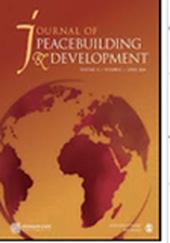
Critical evolutions in the peacebuilding-development praxis nexus: Crisis and Complexity, synergy and transformation
Journal of Peacebuilding and Development, V16: N2, 2021
Article - open access
Over the last 2 decades, the peacebuilding and development nexus has grown as a critical area of scholarship and practice. At the same time, the conflict landscape has evolved in complexity, incor- porating fragility, violence, and humanitarian crisis, presenting ever greater challenges for analysis, framing, and effective policy and practice responses. This article reflects on the paradigmatic shifts occurring and the new paradigms that are arising in response. The article argues that the complexity facing our fields demands inter-paradigm learning, pluralism, and synergy, and the political will to adapt and act in accordance with the transformative measures required to tackle the structural and systemic nature of these crises.
Journal of Peacebuilding and Development, V16: N2, 2021
Article - open access
Over the last 2 decades, the peacebuilding and development nexus has grown as a critical area of scholarship and practice. At the same time, the conflict landscape has evolved in complexity, incor- porating fragility, violence, and humanitarian crisis, presenting ever greater challenges for analysis, framing, and effective policy and practice responses. This article reflects on the paradigmatic shifts occurring and the new paradigms that are arising in response. The article argues that the complexity facing our fields demands inter-paradigm learning, pluralism, and synergy, and the political will to adapt and act in accordance with the transformative measures required to tackle the structural and systemic nature of these crises.
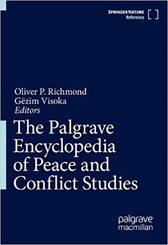
Conflict-disaster nexus
with Mary-Hope Schwoebel
Palgrave Encyclopaedia of Peace and Conflict Studies, eds., O. Richmond and G. Visoka G., London: Palgrave, 2021.
Publisher website
As both conflicts and natural disasters have been increasing in intensity and frequency worldwide, awareness has grown about the devastating and unsustainable human and financial costs. Increasing inequalities between and within countries exacerbate these consequences for those who can least afford them. This encyclopedia entry examines the various manifestations of the relationship between conflict and disaster, and the ways in which they intersect and interact.
with Mary-Hope Schwoebel
Palgrave Encyclopaedia of Peace and Conflict Studies, eds., O. Richmond and G. Visoka G., London: Palgrave, 2021.
Publisher website
As both conflicts and natural disasters have been increasing in intensity and frequency worldwide, awareness has grown about the devastating and unsustainable human and financial costs. Increasing inequalities between and within countries exacerbate these consequences for those who can least afford them. This encyclopedia entry examines the various manifestations of the relationship between conflict and disaster, and the ways in which they intersect and interact.
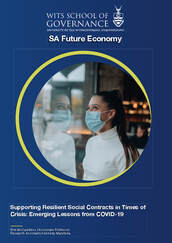
Supporting Resilient Social Contracts in Times of Crisis: Lessons from COVID-19
Working Paper, School of Governance, University of Witwatersrand
Working Paper - open access
This paper unpacks the question of how COVID-19 and the crisis-driven responses to address the pandemic can contribute to wider national goals relating to forging or strengthening national social contracts – that can adapt, evolve and sustain in the face of crisis, and that hold promise for ever-greater levels of wellbeing for all in society. Two sets of cases and evidence are then considered: what drives resilient social contracts on the one hand, and what drives successful COVID-19 responses on the other. A synthesis analysis of how the two can be pursued simultaneously is then put forth. As part of a multi-researcher set of studies reflecting on South Africa’s post-COVID-19 recovery, particular attention is given to the cases of South Africa, alongside the United States and South Korea – countries that are generally considered, respectively, to be having mixed results, not doing well, and excelling
Working Paper, School of Governance, University of Witwatersrand
Working Paper - open access
This paper unpacks the question of how COVID-19 and the crisis-driven responses to address the pandemic can contribute to wider national goals relating to forging or strengthening national social contracts – that can adapt, evolve and sustain in the face of crisis, and that hold promise for ever-greater levels of wellbeing for all in society. Two sets of cases and evidence are then considered: what drives resilient social contracts on the one hand, and what drives successful COVID-19 responses on the other. A synthesis analysis of how the two can be pursued simultaneously is then put forth. As part of a multi-researcher set of studies reflecting on South Africa’s post-COVID-19 recovery, particular attention is given to the cases of South Africa, alongside the United States and South Korea – countries that are generally considered, respectively, to be having mixed results, not doing well, and excelling
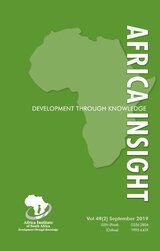
Beyond liberal and local peacebuilding: Alternatives for addressing the complexity of conflict and fragility in Africa
Africa Insight, 49(3) December 2020.
Publisher website
The search for more relevant and effective approaches to building and sustaining peace, preventing violent conflict and reducing fragility is on, with growing cognisance of the failures and limitations of liberal peacebuilding and the ‘local turn’. This paper explores critiques of these and lessons arising in the context of the ever-increasing complexity of the conflict-fragility-violence landscape. Three conceptual and practical framings are examined: endogenous hybridity; transformation; and resilient social contracts. These framings have emerged in the last decade in the peacebuilding field and wider interdisciplinary scholarship and policy arenas. The paper argues that these three framings reflect both realities and aspirations on the ground in Africa, and are giving rise to practical and relevant pathways that hold promise for achieving and sustaining peace.
Africa Insight, 49(3) December 2020.
Publisher website
The search for more relevant and effective approaches to building and sustaining peace, preventing violent conflict and reducing fragility is on, with growing cognisance of the failures and limitations of liberal peacebuilding and the ‘local turn’. This paper explores critiques of these and lessons arising in the context of the ever-increasing complexity of the conflict-fragility-violence landscape. Three conceptual and practical framings are examined: endogenous hybridity; transformation; and resilient social contracts. These framings have emerged in the last decade in the peacebuilding field and wider interdisciplinary scholarship and policy arenas. The paper argues that these three framings reflect both realities and aspirations on the ground in Africa, and are giving rise to practical and relevant pathways that hold promise for achieving and sustaining peace.
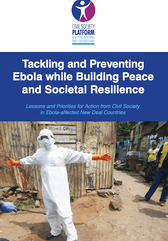
Tackling and Preventing Ebola while Building Peace and Societal Resilience
with Nicolas Bouchet (Editors)
Civil Society Platform on Peacebuilding and Statebuilding (CSPPS), 2015
Report - open access
The study examines the West Africa Ebola crisis, reflecting on the impacts and priorities for recovery and future crisis prevention, through a peacebuilding lens. It reflects on the issues through the framework of the New Deal for Engagement in Fragile States – as the three primarily affected countries are members of this global policy dialogue process. This report offers local civil society analysis from Guinea Conakry, Liberia, Sierra Leone, DRC and Nigeria, on priorities for responding to Ebola on the one hand, and preventing future outbreaks, and strengthening peacebuilding and statebuilding foundations in ways that can address and prevent crises more broadly, on the other.
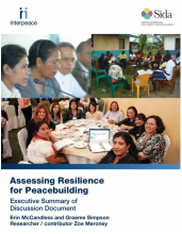
Assessing Resilience for Peacebuilding – Executive Summary
with Graeme Simpson
Interpeace, 2015
Report - open access
This report offers a critical review of resilience, and the evolving approaches related to its assessment and measurement. The report seeks to a foundation for a global conversation on how a resilience approach can inform peacebuilding, and conversely, how a peacebuilding perspective can support and strengthen the evolving resilience agenda. Cross-cutting themes and debates on resilience that have particular relevance for understanding resilience and its relationship to peacebuilding in situations of conflict and fragility are examined, and a conceptualisation of the resilience - peacebuilding relationship, is proposed.
Assessing Resilience for Peacebuilding – Executive Summary
with Graeme Simpson
Interpeace, 2015
Report - open access
This report offers a critical review of resilience, and the evolving approaches related to its assessment and measurement. The report seeks to a foundation for a global conversation on how a resilience approach can inform peacebuilding, and conversely, how a peacebuilding perspective can support and strengthen the evolving resilience agenda. Cross-cutting themes and debates on resilience that have particular relevance for understanding resilience and its relationship to peacebuilding in situations of conflict and fragility are examined, and a conceptualisation of the resilience - peacebuilding relationship, is proposed.
Capacity Development and Resilience
with Frauke de Weijer
In Capacity Development: Beyond Aid
Netherlands Development Organisation (SNV) and the European Centre for Development Policy Management (ECDPM), 2015
Chapter - open access
Resilience is associated with the capacity of individuals, groups and society as a whole to cope, adapt, and transform in the face of man-made and natural shocks. Resilience is being used in the areas of food security, climate change adaptation and disaster risk reduction, as well as peacebuilding and statebuilding. The concept of resilience is already impacting policy at the highest levels. This chapter, in a web-based book, aims to capture and build on key lessons from the last two decades of research and practice in the field of capacity development. It suggests how to apply these lessons in the emerging resilience agenda.
with Frauke de Weijer
In Capacity Development: Beyond Aid
Netherlands Development Organisation (SNV) and the European Centre for Development Policy Management (ECDPM), 2015
Chapter - open access
Resilience is associated with the capacity of individuals, groups and society as a whole to cope, adapt, and transform in the face of man-made and natural shocks. Resilience is being used in the areas of food security, climate change adaptation and disaster risk reduction, as well as peacebuilding and statebuilding. The concept of resilience is already impacting policy at the highest levels. This chapter, in a web-based book, aims to capture and build on key lessons from the last two decades of research and practice in the field of capacity development. It suggests how to apply these lessons in the emerging resilience agenda.
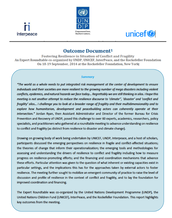
Fostering Resilience in Situation of Conflict and Fragility Outcome Document
Outcome document from an Experts Roundtable co-organized by UNDP, UNICEF, InterPeace,
and the Rockefeller Foundation, NY, 2014
Document available here.
Resilience is becoming increasingly recognised as a key concept and policy instrument in humanitarian, development, and peacebuilding discourses. This document reflects key outcomes and messages drawn from the Expert Roundtable on Resilience, co-organised by the United Nations Development Programme (UNDP), the United Nations Children Fund (UNICEF), Interpeace, and the Rockefeller Foundation. Participants of the roundtable focused in particular on perspectives of resilience in fragile and conflict-affected situations and explored the rich history of resilience across disciplines, emerging tools and methodologies for understanding and assessing the drivers of resilience, and financing and coordination mechanisms to advance resilience building efforts.
